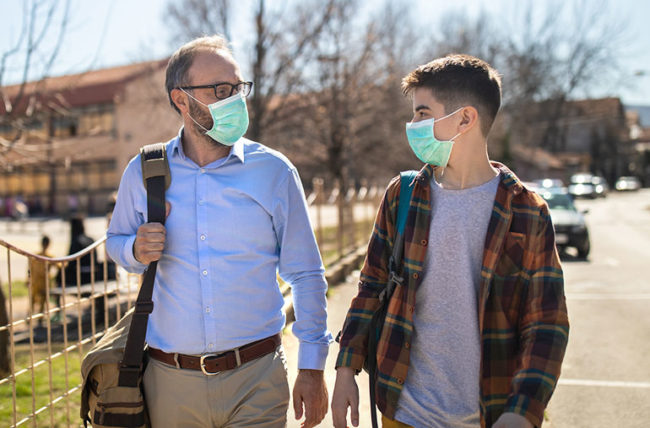Teens Ignoring Coronavirus Warnings? Talk to Them With These Tips in Mind
Teens Ignoring Coronavirus Warnings? Talk to Them With These Tips in Mind
How to help your teen navigate current social challenges
Many teens and pre-teens emerged from mandatory lockdowns to slow the spread of COVID-19 starved for the company of their friends.
Despite new rules of engagement that include wearing face coverings and avoiding large gatherings, some young people packed sidewalks, restaurants, beach and parks. There were hugs and close huddles — sometimes with no masks in sight.
Now, the rate of positive COVID-19 tests in this age group are climbing. Adults have been left wondering whether young people failed to understand the danger or chose to ignore the warnings.
Blame the adolescent brain
Most adults understand that COVID-19 could possibly make them sick enough to die, and that they need to protect themselves from exposure to the coronavirus. They also understand that even people who don’t have symptoms could be infected and spread the virus to others.
But adolescents don’t always think so logically. Abstract thought — which includes the ability to understand consequences — doesn’t tend to develop until the later teen years.
Adult support required
Although adolescents look to their peers for support, direction should come from parents or caregivers.
If you’re a parent of an adolescent, you can help them navigate current challenges by figuring out where they are coming from and playing to their strengths.
Here are some ideas for how to talk to them about following COVID-19 precautions.
- Personalize the message: A conversation about the importance of wearing masks and practicing social distancing might include an example that they can relate to, explained in a loving way. “Say, ‘I know this is super hard for you, but grandma lives with us/I’m considered an essential worker/your sister is in fragile health and can’t afford to get COVID-19, so we all have to live this way. It’s not how life is supposed to work, and I’m so sad it impacts your freedom,’” Dr. Rome suggests.
- Be a role model: For adolescents to fall in step, it helps for them to see their parents — and friends’ parents — model the same behavior. Be vigilant about wearing your mask when you go out and practicing the other precautions you are asking them to take.
- Teach resiliency and empathy: Have a discussion with your teen about how the personal and family sacrifices brought on by COVID-19 can benefit the community. Explain how low infection numbers could protect essential workers and leave room in hospitals for other emergencies. Invite your child to be part of the solution. “Solicit their ideas, such as practicing random acts of kindness, setting up Zoom sessions with grandparents or selecting food to donate to local shelters,” Dr. Rome says. “These are projects that feed their soul.”
- Focus on the positive: Encourage your teen to take time to recall what they are grateful for. And take time to laugh. “Laughter is a great tension reliever,” Dr. Rome says. “It’s just fine for teens to find something funny on YouTube and share it with you, or to watch a funny movie together.”
- Give them some independence — but within a framework: Since adolescents crave independents, it can actually be helpful to give them some leeway. “Arrange a schedule that ensures they get sufficient sleep but also have plenty of time for online socialization, exercise or other pastimes,” she says.
Read full article HERE
Source: Cleveland Clinic





